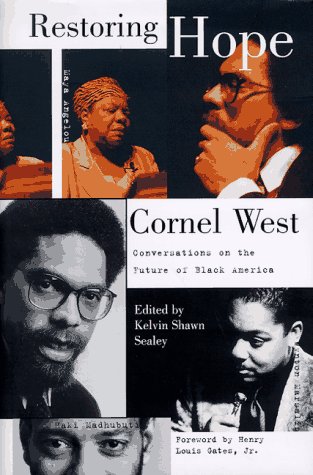Synopsis
The prominent black intellectual interviews nine artists, scholars, and public figures--including Maya Angelou, Bill Bradley, Patricia Williams, and Haki Madhubuti--about the reasons for blacks to have hope for the future and other topics. 200,000 first printing. Tour.
Reviews
West was justly praised for his provocative study Race Matters (1993), an exploration of the nature of racial discourse in contemporary America. Those looking for the same kind of probing and original explorations of race in these transcripts of West's conversations about race with, among others, Maya Angelou, Harry Belafonte, and Charlayne Hunter-Gault, will probably be disappointed. West notes in his introduction that ``a specter of despair haunts late twentieth-century America . . . Wealth, inequality and class polarization are escalating.'' To counter this, he argues, the times require those willing to ``speak our fallible truths, expose the vicious lies, and bear our imperfect witness.'' The problem here is that, as is usually the case with conversations, the quality of testimony and thought varies greatly. Those familiar with, for instance, Maya Angelou's ideas will find little new here. There are moving moments, such as Belafonte's call for viewing struggle not as ``some harmful, negative thing'' but as an action of great dignity, power, and beauty, but too often the things said are unsurprising and without much impact. A mixed bag, best for West's typically salty and precise comments throughout. (Author tour) -- Copyright ©1997, Kirkus Associates, LP. All rights reserved.
How is hope created and maintained? In his Race Matters (LJ 3/15/93), West said that there was an "eclipse of hope and the collapse of meaning in much of black America." With this book he returns to the topic of hope and meaning in the African American community by conducting a series of interviews with leading politicians, writers, musicians, journalists, and scholars, including Bill Bradley, Charlayne Hunter-Gault, Wynton Marsalis, and Maya Angelou. Each talks of how hope can be created and nurtured through the strength of the traditional black church, the love of close families, and the experience of shared cultural history and traditions. The interviews?thoughtful, intimate, and intriguing?make the reader believe that hope in black America can indeed be restored. Recommended for all libraries.?Nora Harris, Marin Cty. Free Lib., San Rafael, Cal.
Copyright 1997 Reed Business Information, Inc.
"About this title" may belong to another edition of this title.
